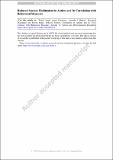Reduced Sensory Habituation in Autism and Its Correlation with Behavioral Measures
Author(s)
Jamal, Wasifa; Cardinaux, Annie; Haskins, Amanda J.; Kjelgaard, Margaret; Sinha, Pawan
Download10803_2020_4780_ReferencePDF.pdf (1.077Mb)
Open Access Policy
Open Access Policy
Creative Commons Attribution-Noncommercial-Share Alike
Terms of use
Metadata
Show full item recordAbstract
Abstract
Autism is strongly associated with sensory processing difficulties. We investigate sensory habituation, given its relevance for understanding important phenotypic traits like hyper- and hypo-sensitivities. We collected electroencephalography data from 22 neuro-typical(NT) and 13 autistic(ASD) children during the presentation of visual and auditory sequences of repeated stimuli. Our data show that the ASD children have significantly reduced habituation relative to the NT children for both auditory and visual stimuli. These results point to impaired habituation as a modality-general phenomenon in ASD. Additionally, the rates of habituation are correlated with several clinical scores associated with competence along diverse phenotypic dimensions. These data suggest that the sensory difficulties in autism are likely to be associated with reduced habituation and are related to clinical symptomology.
Date issued
2020-11-11Department
Massachusetts Institute of Technology. Department of Brain and Cognitive SciencesPublisher
Springer US